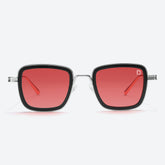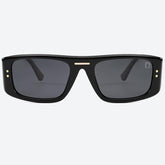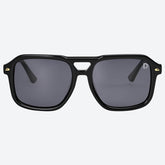Does Wearing Glasses Improve Eyesight
There’s been an ongoing myth that wearing eyeglasses will weaken your eyesight. This has caused a general reluctance among many when it comes to getting prescription glasses. But is this myth true? Does wearing glasses improve eyesight or worsen it. In this article, we’ll discuss the many benefits of wearing prescription eyeglasses.

Will Glasses Improve Your Eyesight?
The simple answer is yes, but only during the period you have them on. If you want a permanent solution, you will have to treat whatever eye issue has caused you to require glasses. Your eyeglasses only correct your vision temporarily, based on the existing prescription. Once you remove your glasses, your sight returns to how it was before you wore them. Depending on your eye defect, there may be some medical treatments capable of fixing the issue. Otherwise, you will have to rely on your glasses to always correct your vision by wearing them all the time. However, if your eyeglasses do not improve your eyesight, contact your optician.
You should note also, that there are a few cases where the corrective lenses actually make the eyesight better over time, but this usually happens with children. Also, this is usually for eye conditions like amblyopia. In such cases, the child stops using the glasses once the condition is resolved.
Why Should You Wear Glasses?
There are different reasons why you may need to wear glasses. We discuss some of them below.
Glasses for Blurry Vision
Blurry vision is the most common reason people need eyeglasses. It can either be that your vision gets blurry up close (farsightedness), at a distance (nearsightedness), or both (astigmatism). In all these cases, eyeglasses can help resolve such blurry vision, and their effects are noticeable from the first time you wear them.
Glasses for Double Vision
Although not as common as blurry vision, double vision is another reason you may need to wear glasses. A person who suffers from double vision sees two images of the same object either at a distance or close up. Once a person is diagnosed with such an issue, and illnesses such as tumors or stroke have been ruled out, they receive prescription lenses to correct such vision.
Eye Protection
This is a problem peculiar to our digital age, where we’re all surrounded by electronic screens. These screens emit blue light that is harmful to the eyes, which is why you need glasses with anti-blue light capabilities. Similar to this, you also need glasses to protect your eyes from the harmful UV radiation the sun emits. Finally, eyeglasses can also protect your eyes from dust and dirt.
Why does Your Eyesight seem to get worse after wearing glasses?

This is another question as popular as the “Does wearing glasses improve eyesight” question. The answer though is that wearing glasses doesn’t make your sight get worse, even though it seems like it. What actually happens is that your brain has become used to seeing the world more clearly, so when you remove your prescription glasses everything looks blurrier than you remember before you started using the glasses. It’s all just an issue of perspective.
You might want to argue that people often require stronger prescription glasses over time. However, this happens because of factors like genetics, age, and habits. These factors can make the lenses inside your eyes change their shape or lose flexibility over time, and as a result, you will need stronger prescription lenses.
It’s also noteworthy that myopia (nearsightedness) usually becomes slightly worse with age. Then we have age-related presbyopia which also naturally gets worse with age. So, prescription glasses correct eye issues—it doesn’t make them worse.
Benefits of wearing glasses
Improved visual acuity
Eyeglasses can help correct the effects of eye issues like farsightedness, nearsightedness, presbyopia, or astigmatism. With the proper pair of eyeglasses, you will have clearer eyesight. Usually, these glasses correct refractive errors of the eye lenses, so you can see the objects in clearer detail. They are very useful for activities like driving and reading.
Reduced eye strain
Eye strains have become more common as people become more immersed in the digital world every day. Spending hours learning, working, or playing games on electronic gadgets can lead to serious strain on your eyes. This leads to symptoms like blurred vision and frequent headaches. With a pair of prescription eyeglasses, you can prevent this issue. These glasses can filter off blue light coming from your electronic screens.
Sun protection
We now all know about the harmful effects of the sun’s UV radiation, especially on the eyes. Thanks to advancements in technology, we now have an array of options to protect the eyes from these UV radiations. We now have polarized sunglasses, prescription sunglasses, and transition lenses.
Protection from irritants
There are several tiny particles in the air (like dirt and dust), so small that you may not see them with your eyes—yet they’re capable of causing irritation to your eyes. A pair of glasses can create a barrier that protects your eyes from most of these microscopic irritants. This reduces the chances of your eyes getting scratched or irritated.
Variety of fashionable styles
Eyeglasses are also fashionable enough that you can make them a part of your fashion ensemble. There are countless designs, shapes, and colors for both the frames and the lenses. Together with your optician, you can easily pick a style that suits your personality.
Effects of Wearing the Wrong Prescription Glasses

While discussing the topic; does wearing glasses improves eyesight, we should also discuss the effects of wearing the wrong prescription eyeglasses. You should avoid wearing the wrong prescription eyeglasses because the consequences can be quite severe. We discuss some below.
Nausea
One of the most typical effects of using the wrong prescription lenses is nausea. When you use the wrong pair of glasses, you have to strain harder to focus on objects. This can cause nausea, accompanied by headaches (we discuss that too).
Fatigue
You may also experience fatigue if you wear the wrong prescription eyeglasses. As we already explained, your eyes are straining harder to focus on objects, so they naturally wear out and become tired, which manifests itself as fatigue.
Blurred Vision
This is another common symptom of wearing the wrong prescription glasses. The lenses’ refractive powers will make objects out of focus when they arrive at your retina. What you get is blurred images that hinder your eyesight.
Headaches
Yet another common symptom of using the wrong prescription eyeglasses is how they cause you headaches. When you use a wrong prescription glasses, the eyestrain that follows will cause you to take them off intermittently to rest your eyes. But also, prolonged use of such glasses will make you have severe headaches.
Vertigo
Vertigo is that sensation that makes you feel you’re rocking or spinning, even though you're at rest. It can happen if you look down from a tall building. Vertigo occurs when you lose your sense of depth and balance, which is actually a function of your inner ear. When you wear the wrong prescription eyeglasses, it can disrupt your eyes' ability for depth perception. This can lead to lightheadedness or dizziness because you’re thrown off balance.
Scientific tips for protecting eyesight

Go for regular eye exams
Regular eye checkups remain the most important way to take care of your eyes. Your eyes may seem healthy, but there’s no way to be certain unless you get them checked. Also, regular checkups will ensure that eye conditions can be detected early enough, and some of these issues can be corrected effectively when detected early enough.
Eat vision-healthy foods
Healthy eating is also important for keeping your eyes healthy. Some foods contain nutrients that are beneficial to the eyes, examples include carrots. Fruits and vegetables containing vitamin A—especially dark leafy vegetables—are very good for the eyes. Vegetables like kale, spinach, and collard greens contain zeaxanthin and lutein, which are powerful antioxidants that help prevent cataracts. Certain fishes like mackerel, salmon, tuna, halibut, and sardines are also good for the eyes because they contain omega-3 fatty acids.
Keep your weight under control
Diabetes and other illnesses related to obesity can result in developing eyesight-related complications. Some researches confirm that weight loss has the potential to reverse eye complications arising from high blood pressure, diabetes, and obesity. Others have shown that people who exercise regularly have a significantly lower chance of developing glaucoma.
Wear sunglasses when outside
We all love sunglasses! They make any outfit pop. But beyond being a trendy fashion statement, sunglasses play a crucial role in safeguarding your eyes from the sun's harmful ultraviolet (UV) rays. A 2016 report by the Vision Council highlighted a concerning trend—while 75% of people living in the U.S. expressed concern about potential eye issues from UV exposure, only 31% took the necessary step of protecting their eyes with sunglasses outdoors.
When choosing sunglasses, prioritize safety over style. Opt for shades that block 99–100 percent of UVA and UVB radiation, and ensure you purchase from a reputable source. At Dollger, we have an array of stylish sunglasses that’ll make you step out looking trendy while protecting your eyes. Whether you’re basking on the beach, tackling mountain trails, or enjoying a sports event, always prioritize eye protection by donning the appropriate sunglasses.
Rest your eyes regularly
If you usually immerse yourself for long hours in front of computer screens, it takes a significant toll on your eye health. The National Eye Institute recommends the 20-20-20 rule to ease eye strain—after every 20 minutes of screen time, divert your gaze to something 20 feet away for 20 seconds. Also, not blinking frequently while working on your computer swears your eyes out. According to research published in the journal, Ophthalmology, there’ll be a surge in short-sightedness by 2050 because of extensive close-up electronic device use. The only way to prevent this is by incorporating outdoor breaks and reducing constant up-close focus activities. Additionally, if protective eyewear is necessary as part of your job, make it a habit to wear it consistently to safeguard your eyes from potential damage and strain.
Conclusion
In conclusion, wearing glasses is essential for improving and maintaining optimal eyesight. Neglecting to wear prescribed glasses may lead to recurring eyesight issues. Regular eye exams are crucial for accurate prescriptions, ensuring your vision stays sharp. Trust your optometrist's recommendations, and embrace the right pair of glasses—whether for a new prescription or stylish frames—to enhance, not compromise, your eyesight.





